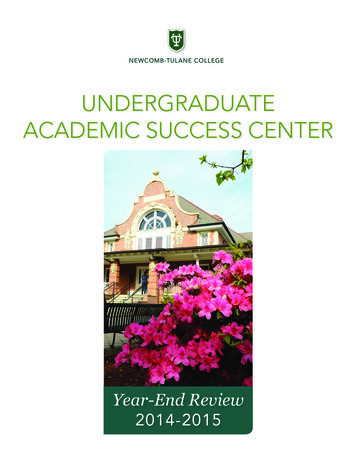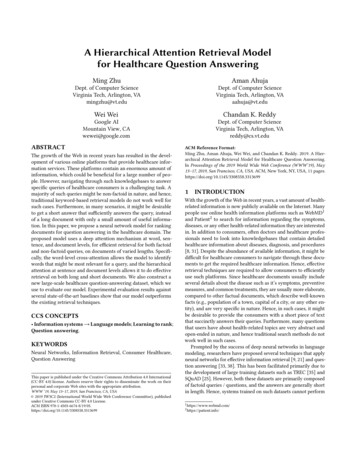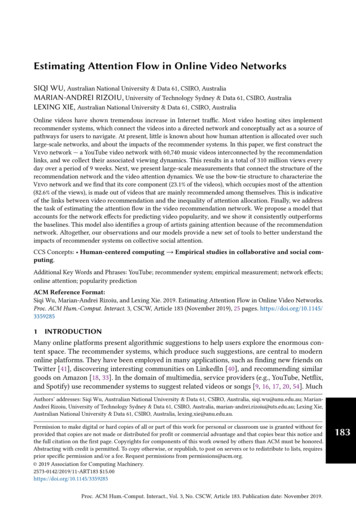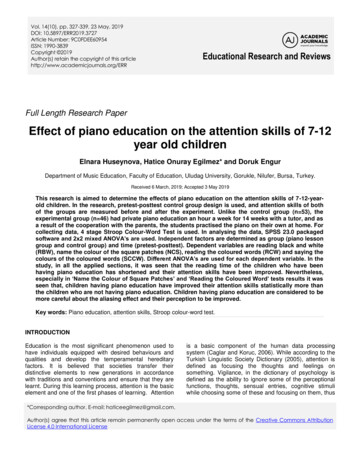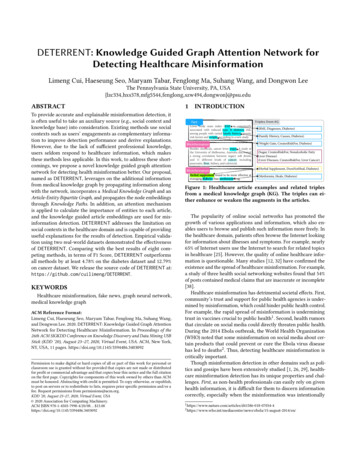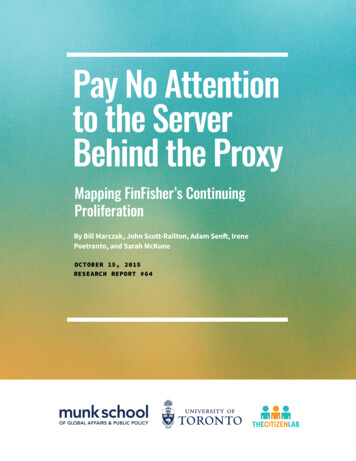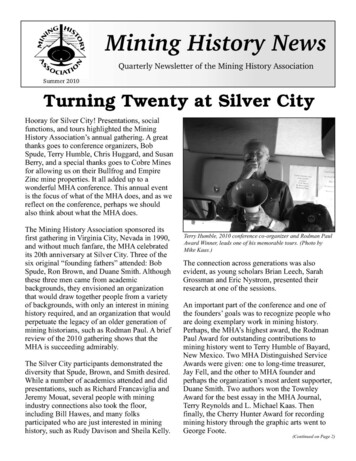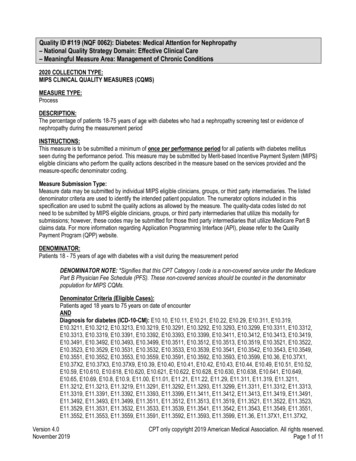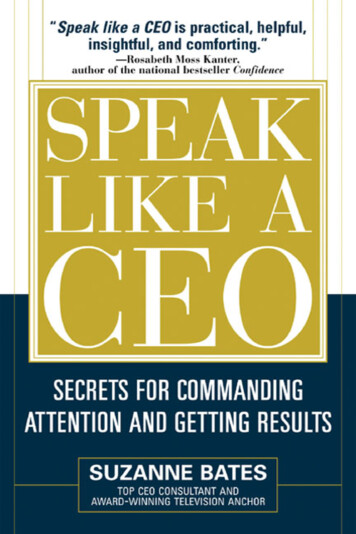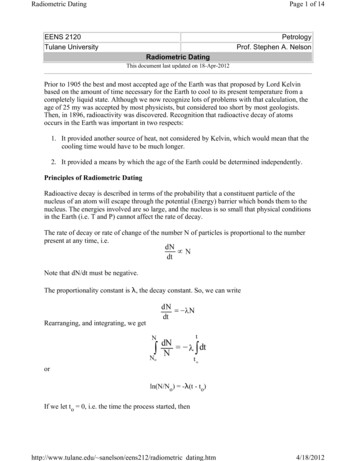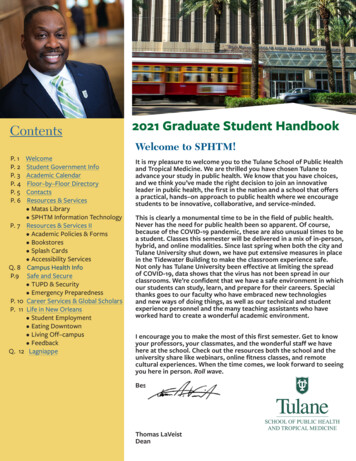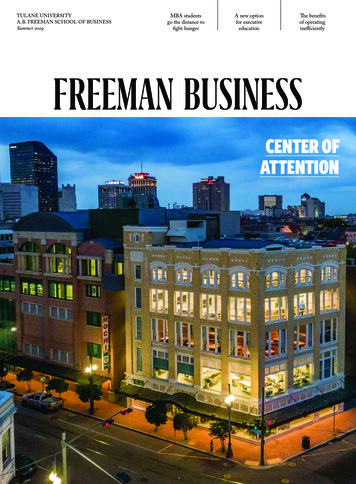
Transcription
TULANE UNIVERSITYA. B. FREEMAN SCHOOL OF BUSINESSSummer 2019MBA studentsgo the distance tofight hungerA new optionfor executiveeducationThe benefitsof operatinginefficientlyCENTER OFATTENTION
A . B. F R EEM A N S C H O O L O F B U S I N E S SVo l u m exxxiv/ Issue No. 2 / Summer 2019CONTENTSALSO IN THIS ISSUE3 FROM THE DEANThe myth of the ivory tower.4 NEWSMBAs go the distance to fight hunger,Freeman launches MBA/Master ofSustainable Real Estate Developmentprogram, Netscape founders highlightNew Orleans Entrepreneur Weekand more.2218 RESEARCHUsing big data to improve health care,a new approach to an old managementproblem, selected faculty publicationsand more.ON THE COVERCENTER OFAT TENTIONWith the opening of the Stewart Center CBD, a new state-of-the-artfacility in downtown New Orleans, the A. B. Freeman School ofBusiness is in the right place at the right time to implement a hostof strategic initiatives. By Mark Miester. Photographs by Jackson Hill.On the cover: The Stewart Center CBD at dusk. Photograph by Jackson Hill.JACKSON HILL34 ALUMNIA sanctuary in the Marigny, thelifesaving potential of “fat-on-a-chip,”Altman Scholar brings global expertiseto Ukraine and more.40 CLOSING BELLThe poetry of New OrleansEntrepreneur Week.
2U PF R O N TFreemanRecommendsFreemanVoicesFreeman faculty & staffrecommend the followingQuotes and quips from thisissue of Freeman Business.DEANIra SolomonSENIOR ASSOCIATE DEANFOR FACULTYPaul A. SpindtDIRECTOR OF MARKETINGAND COMMUNICATIONSMia Noerenberg MillerPUBLICATIONASSOCIATE DEANSClifton Brown, Accreditation& Strategic PlanningJohn Clarke, GraduateProgramsJohn Trapani, InternationalProgramsEDITORMark MiesterART DIRECTORTana ComanCONTRIBUTORSKeith BrannonAnthony EndelmanMichael LukeMia Noerenberg MillerAnn Marshall TiltonMary Ann TravisPHOTOGRAPHERSSally AsherPaula Burch-CelentanoAlejandro de los RiosCheryl GerberJackson HillTracie Morris SchaeferFreeman Business is a biannual magazinepublished by the A. B. Freeman Schoolof Business, 7 McAlister Place, Ste. 415 C,Tulane University, New Orleans, LA 70118.Send editorial correspondence to the aboveaddress or email freeman.info@tulane.edu.Opinions expressed in Freeman Businessare not necessarily those of A. B. FreemanSchool of Business or Tulane Universityrepresentatives and do not necessarilyreflect school or university policies. Materialmay be reprinted only with permission.Tulane University is an affirmativeaction/equal opportunity institution.“AN INTRODUCTIONTO INFORMATIONSECURIT Y ”National Institute of Standards andTechnology, U. S. Department of Commerce“Most business people are aware of theproblems involving information security, butarticles in the popular business press aretypically superficial and books which go intodetail typically require an extensive computerbackground. For non-computer specialists,this special publication from the NationalInstitute of Standards and Technology offerskey information security principles to helporganizations prevent data breaches, theft oftrade secrets, “man-in-the-middle” capturesof communications, invasions of privacy,identity theft and denial of service attacks.”JOHN PAGE,Associate Professor of Accountingand Information SystemsWEBSITE“The main thing is toalways keep the mainthing the main thing. Nomatter what your persuasion is, we’re not keepingthe main thing the mainthing as a country.”JIM CLARK,founder and chairman of NetscapeCommunications Corp. (page 9)“The hospital cannot bearall of the responsibility ofpatient care, especiallyfor patients with chronicconditions. These conditions need to be managedover time in a variety ofsettings. Hospitalizationmay not even need tooccur if the condition isproperly managed.”CLAIRE SENOT,assistant professor of management science(page 19)WWW.SCRUBBER.SOCIAL“Scrubber is a website that singles outpictures, posts and comments in your socialmedia accounts that may be inappropriate.Want to start looking for a new job? Parentof senior applying to colleges? Angling fora promotion? Scrubber will let you knowwhich pesky posts should be removed so youcan begin your next endeavor with a clean,embarrassment-free slate.”ASHLEY KELLER NELSON,Professor of Practice inManagement Communication“Not all organizationsneed to offer all rewards.The critical thing is thateach organization offersthe most importantrewards for its specificemployees.”SERENA LOFTUS,assistant professor of accounting (page 20)
A . B. F R EEM A N S C H O O L O F B U S I N E S SSUMMER 20193FROMTHE DEANTHE MYTH OF THEIVORY TOWERAfew weeks ago, I was discussing the strategy behind theStewart Center CBD, our new facility in downtown NewOrleans, when a colleague casually referenced a conceptwe’ve all heard before: the ivory tower.His point was that the Stewart Center CBD — throughboth its location and programming — stands in sharp contrast to thestereotypical notion of a university detached from its community.That observation brings up a fact that I think too few of us trulyappreciate: Tulane University has never been an ivory tower.The Medical College of Louisiana, the precursor to Tulane, wasfounded in 1834 not as an elitist citadel but as a practical response tothe very real — and very local — threats of cholera and yellow fever.Eighty years later, Tulane University’s College of Commerce andBusiness Administration was similarly established not to ruminateon economic theory but to provide local businesses with employeesequipped with the requisite knowledge and skills to compete in achanging, post-Panama Canal world.Since then, both Tulane and the A. B. Freeman School of Businesshave continued to tackle problems of local significance and globalproportions. You see it in our research. You see it in our academicprograms. You see it in our service learning and community outreach.And you see it in our alumni, who use their Tulane experience to takeon the world’s greatest challenges.KENNETH HARRISONAnd therein, I think, lies part of the problem:People sometimes confuse our focus on globalissues with a lack of concern for the local. Inactuality, the very opposite is true.In the wake of Hurricane Katrina in 2005,Tulane University recognized that the healthof the university was inextricably linked tothe health of the local community. Through arenewed focus on New Orleans, Tulane couldIra Solomonhelp ensure the long-term survival of thisremarkable city while developing real-world expertise and betterpreparing students to address society’s most pressing challenges.When I became dean of the Freeman School in 2011, I embracedthe notion of using New Orleans as a laboratory for learning, researchand innovation. Since then, we’ve worked vigorously to build strongconnections between Freeman and the business community: OurBusiness TIDES students work with local nonprofits like Upturn Artsto implement marketing strategies. Our MBA students work withlocal companies like Zatarain’s to explore new product opportunities.Our Master of Business Analytics students recently worked with theNew Orleans Pelicans to analyze attendance patterns and recommenddata-driven marketing strategies. And through our Lepage Centerfor Entrepreneurship and Innovation, we support and help grow thecity’s entrepreneurial ecosystem through programs like the TulaneBusiness Model Competition and New Orleans Entrepreneur Week.By focusing on New Orleans, we are providing extraordinarylearning opportunities for students while helping to build a stronger,more vibrant economy, one that will ultimately benefit us all.The Stewart Center CBD, which opened in January 2019, is anessential component in this strategy. This stunningly restored facilityplaces us in the heart of the city’s business, technology and hospitalitydistricts, strategically positioning us to more effectively deliver programs serving the area’s more than 65,000 working professionals. Inaddition to serving as the new home of our executive MBA program,the Stewart Center CBD will house custom non-degree executiveprograms, enabling us to meet a growing demand for short-termcourses that inculcate the applied knowledge and skills needed tocompete. We also hope to leverage our proximity to the New OrleansCulinary & Hospitality Institute to deliver programs related to ournew initiative on entrepreneurial hospitality. Finally, the space willenable us to host events that bring our students closer to workingprofessionals, building connections that can lead to jobs, new businessventures and, ultimately, a greater sense of community.For more than 100 years, the Freeman School has enjoyed aclose relationship with the New Orleans business community. Withthe opening of the Stewart Center CBD, we hope to build on thatrelationship and become an even more central part of the city’seconomic revitalization. FB
4NEWSMBAS GO THE DISTANCETO FIGHT HUNGERBanco de Alimentos serves the poor of Buenos Airesby collecting and distributing food donations to morethan 900 soup kitchens across the metropolitan region,but deploying the organization’s army of nearly 6,000volunteers had become an increasingly difficult challenge.To help develop a strategy for better managing itsvolunteers, Banco de Alimentos turned to the Freeman School and ateam of second-year MBA students, who analyzed the organization’soperations and proposed recommendations to help it make the mostof its unpaid workers.“It was really exciting to know that the research we did wasrelevant and was going to be utilized,” said Sesa Leavoy (MBA ’19),who worked on the project. “The feedback was really positive forour group.”The consulting project was part of the course Global LeadershipIII , which for the last eight years has connected FreemanMBA students with Latin American NGOs in need of consultingservices. The students spent the first eight weeks of the course communicating with the clients via Skype and email. In October, the classtraveled to Buenos Aires to meet their clients in person and presenttheir recommendations.Participants in theBanco de Alimentosconsulting project includedYasamin Asgari (MBA ’19),Sesa Leavoy (MBA ’19), PaulFaciane (MBA ’19), Banco deAlimentos’ Solange Basso,Teddy McCullough (MBA ’19)and Devin Francis (MBA ’19).“It’s a win-win for everyone involved,” said Eduardo Guzman,lecturer in management and instructor in the course. “The MBA students get an international consulting experience and the opportunityto work with an NGO, which I think really appeals to them. Forthe NGOs, this may be their only opportunity to receive consultingservices because most don’t have the resources to hire consultants.”Banco de Alimentos initially told its student team it neededmore volunteers, but Leavoy and her teammates — Yasamin Asgari,Devin Francis, Paul Faciane and Teddy McCullough — convincedthe organization to focus instead on recruiting the right volunteers.Through a partnership with supermarket chain Carrefour, Banco deCOURTESY BANCO DE ALIMENTOS
A . B. F R EEM A N S C H O O L O F B U S I N E S SJamie Milstein (BSM ’19)Alimentos had recently begun transporting food donations frompitches her business Owlsupermarkets directly to soup kitchens across Buenos Aires, a logisVision to judges at thetical challenge due to the highly perishable nature of the donations.Outdoor Weber Competition.The MBAs encouraged Banco de Alimentos to focus its recruitingMilstein won third place anda prize of 10,000 in theefforts not on volunteers in general but specifically on drivers able tocompetition.transport donations at short notice.“You’d rather have 10 of the right people than 100 of the wrongpeople, so we gave them a high-level strategy for how to recruit theright people,” Leavoy said. “One of the things they were concernedabout was making sure that their drivers felt like they were partof their volunteer community since theyweren’t going to be working in the building,so we talked to them about an orientationspecifically for drivers and other ways to helpthem get that sense of belonging and senseof the impact they’re making.”In addition to Banco de Alimento,the class worked with three other NGOs:Comunidad Huerta, a network of organicproduce farmers; Gestiones Solidarias, aworkforce training organization that servesmarginalized populations; and REDBdA, analliance of food banks. Guzman said all theclients were happy with the projects, andEDUARDO GUZMAN, lecturer inmost have already begun to put the students’management and instructor in the courserecommendations into practice.“It’s very satisfying to see that some ofthe solutions we offered are already being implemented,” said KathyRai (MBA ’19), whose team worked with Comunidad Huerta. “It feelsgreat to know we made a little impact for the business.”Argentine NGO Banco deAlimentos enlists an army ofLeavoy echoed that thought.volunteers to transport food“If we can help Banco de Alimentos retain more volunteers thandonations to soup kitchensthey would have before we did this project, we’re helping more peoplethat feed hungry adults andchildren across Buenos Aires.get fed,” she said. “For me, that’s a significant win.” FBSUMMER 2019“It’s a win-win for everyoneinvolved. The MBA studentsget an international consultingexperience and the opportunityto work with an NGO, which Ithink really appeals to them.”5EntrepreneurshipSENIOR WINS 10K IN WEBERS TA T E B U S I N E S SCOMPETITIONJamie Milstein (BSM ’19) won thirdplace and a prize of 10,000 in the finalround of Weber State University’s“Outdoor Weber” Competition. Theevent, sponsored by Camping World,is a three-day outdoor recreation ideacontest that took place in March in Ogden,Utah. Milstein, a student in the FreemanSchool’s New Venture Accelerator courseand a participant in the Lepage Center’sStudent Venture Incubator, earnedthird-place honors with her pitch for OwlVision, a smart device she’s developingthat can instantaneously stream dataand statistics.“The whole experience has been sosurreal,” Milstein said. “I never thoughtI would have made it to the finals, muchless place in the top three. I had someamazing on-site mentors during the competition who helped me think throughthe product more critically, which wasinstrumental to my success, and being inthe New Venture Accelerator class taughtme the foundations of starting a companyand all the components to consider whenbuilding out a product. I couldn’t havedone it without that.”Milstein said she plans to use the prizemoney for hardware and software development and patent and legal costs.
6K I C K E R
A . B. F R EEM A N S C H O O L O F B U S I N E S SSUMMER 2019Real EstateT U L A N E L A U N C H E S N AT I O N ’ SF I R S T M B A / M A S T E R O F S U S TA I N A B L ER E A L E S TAT E D E V E L O P M E N T P R O G R A MThe A. B. FreemanSchool of Businessis partnering withthe Tulane Schoolof Architectureto offer the firstMBA/Masterof SustainableReal EstateDevelopmentprogram in thenation.The Freeman School has announced a partnership with the Tulane University School ofArchitecture to meet the increasing demandfor business professionals equipped with thetools for a career in real estate development.The MBA/MSRED will offer students anunrivaled preparation with a broad foundation in business disciplines as well as specialized knowledge fromthe nation’s only master’s program in Sustainable RealEstate Development.“With the exponential growth of the real estatemarket, prospective real estate professionals must combine business expertise with an understanding of thesocial and environmental costs of development,” saysIra Solomon, dean of the Freeman School. “The MBA/MSRED program builds upon the rigorous core of theFreeman School’s nationally ranked MBA programto create a comprehensive and holistic approach tosustainable development.”In conjunction with the School of Architecture,the program awards students an MBA and a master’s degree in Sustainable Real Estate Development.Through the real-world application of theory to current real estate development projects, graduates willbe prepared for the rapidly evolving challenges facingthe industry. Students will be equipped to successfullymanage in all areas of real estate development —finance, analytics, design, management and consulting— with both the qualitative and quantitative skillsCOURTESY OF TULANE SCHOOL OF ARCHITECTUREneeded to make informed business decisions.“We are disrupting how real estate has been taught todrive change in the educational landscape of this field,”says Casius Pealer, director of Sustainable Real EstateDevelopment and Shane Professor of Practice at theTulane School of Architecture. “We want students toanalyze the implications of technology, environmental changes and urbanization to better understand howpolitical, ecological and cultural forces impact real estatedevelopment. By creating an interdisciplinary program,our alumni can anticipate thelong-term social and financialeffects of development.”The MBA/MSRED is an accelerated two-year, full-time programdelivered during the weekday fromthe historic Tulane Universitycampus in Uptown New Orleansas well as the Freeman School’snew downtown facility. Studentswill benefit from Freeman’s smallcohorts, active learning environment and direct engagement withindustry leaders. Freeman is alsooffering new real estate specializations in its full-time and part-timeProfessional MBA programs, aswell as in its 10-month Master ofManagement program.“New Orleans is an exceptional place to study real estatedevelopment because of its storiedhistory, ongoing redevelopmentand rapid growth,” says Matt Schwartz, co-chief executiveofficer of the Domain Cos. “Our rich architectural historyand dedication to preservation blends with the innovativedevelopment strategies currently driving the reinvestmentin and revitalization of the city, making New Orleans anexceptional incubator for learning.” FB“ The MBA/MSRED program builds uponthe rigorous core of the Freeman School’snationally ranked MBA program to createa comprehensive and holistic approachto sustainable development.”IRA SOLOMON, dean of the Freeman School7
8N E W SThe IndicatorA. B. Freeman School of BusinessFaculty Quoted in the MediaJune 6, 2019“Employers truly value experiential learning,and it doesn’t get any more hands-on thanBurkenroad Reports. The report itself opensdoors and provides a great example of thecandidate’s writing and analytical skillsas well as their ability to put out a quality,timely product as a member of a team.”PETER RICCHIUTI,senior professor of practice and founderof Burkenroad Reports, on the program’svalue for students entering the job market.Read article online at https://tulane.it/2RaMxpsApril 9, 2019“Over the course of your internship,remember the importance of teamwork.The skills you acquire managing personalitiesare almost as important as theaccounting experience.”CHRISTINE SMITH,professor of practice in accounting andassistant director of the BSM/Master ofAccounting program, on things students cando to make their first internship a success.Read article online at https://tulane.it/2WZao0DApril 3, 2019“You should always pay off yourcredit card in full and do your best not tomake purchases that you cannot afford.However, if you do need to carry a balance,it’s important to consider how long you needto carry it. Many credit cards will offer a0% APR as an introductory rate and thenquickly raise the interest rate once theintroductory period is over.”AMANDA HEITZ,assistant professor of finance, on how tochoose a low-interest credit card.Read article online at https://tulane.it/2ItlstmTulane Professor of History Walter Isaacson,left, discussed the history of NetscapeCommunications Corp. with company founderJim Clark, center, and CEO Jim Barksdale in aNew Orleans Entrepreneur Week keynote talk.TechnologyINTERNET PIONEERSHIGHLIGHT NOEW 2019Netscape CommunicationsCorp. revolutionized computing in 1994 with therelease of the world’s firstcommercial web browser,which helped jump-start the WorldWide Web and launch the do
TULANE UNIVERSITY . A. B. FREEMAN SCHOOL OF BUSINESS. Summer . 2019. MBA students . go the distance to fight hunger A new option . for executive education The ben
